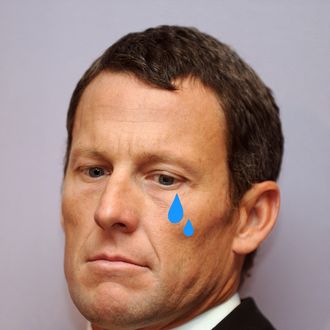
No matter your reaction to Lance Armstrong’s “confession” to Oprah Winfrey, it is worth asking why he in particular has been the target of such intense scorn. There is the obvious, of course: The seven-time Tour de France winner lied about his doping for a decade, and in a self-aggrandizing, peevish way that turned even longtime supporters against him. But then again: Cycling has been eaten inside out by doping over the past twenty years; it’s more difficult to find a cyclist who didn’t dope than one who did. His fundamental problem, and the one he can never recover from, is that he was just too good.
Performance-enhancing drugs don’t instantly make their users stronger or faster. Instead, their purpose is to help an athlete recover from workouts more easily and quickly. (Confessed PED users like Mark McGwire and Rick Ankiel have said that they started using the drugs after career-threatening injuries.) Popping the occasional pill does not make you into a muscled monster with a huge skull; with most athletes, you’d never tell. But this is not how people tend to see things. They view PEDs through the prism of the two athletes who first made steroids so scandalous, Barry Bonds and Roger Clemens. Those two former players, recently left hundreds of votes short of the Hall of Fame, established the notion of PEDs as the sports equivalent of Popeye’s spinach, or video-game cheat codes. The process, in the popular perception, is straight cause and effect. Pop a pill, grow cartoonishly strong, step to the plate (or walk to the mound, or get on a bike), smash records.
Many of those who have failed tests for PEDs in baseball weren’t hulking sluggers; they were in fact pitchers, often on the downside of their career and looking just to hang on another season or two. Informed fans tend to give guys like this another chance. Because those players never appeared physically “exceptional,” they can be forgiven. Even though the more average athlete is precisely the sort of athlete who needs PEDs most. Maybe the best example of this is the Yankees’ Andy Pettitte, who admitted to using HGH and has nonetheless suffered basically zero public blowback. Part of this is because Pettitte is likable in a way Bonds and Clemens (and certainly Armstrong) aren’t; everybody likes Andy Pettitte. But the larger reason is that Pettitte doesn’t seem like a PED user. He’s not bigger than everyone else. He doesn’t throw harder. He isn’t aggressive and standoffish. He’s a wily veteran who gets by on guile and smarts. He doesn’t have the cheat code, and so people don’t hate him nearly as much.
The fundamental misunderstanding of how PEDs work hits Armstrong especially hard. Never mind Armstrong fans’ not understanding his doping and what it did or didn’t do for him; they don’t even understand the sport he participated in. (Go ahead, name another cyclist.) Therefore, there’s no room for nuance in Armstrong’s story: He cheated, and because he cheated no one could beat him, and now that he’s been found out, his achievements are entirely invalid, and no apology can salvage them. If people understood more about PEDs and cycling, Armstrong might, maybe, have a future as a public figure. But who wants to care more about PEDs and cycling? People just wanted to be inspired. And now: We just want to be angry.
*This article originally appeared in the January 28, 2013 issue of New York Magazine.






























